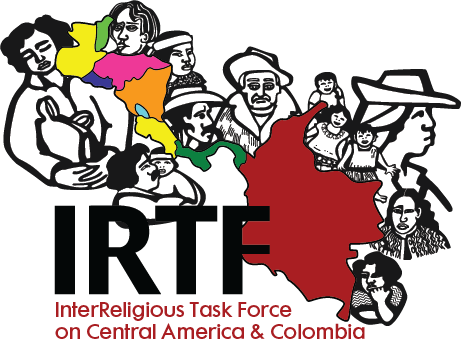- Home
- About Us
- Issues
- Countries
- Rapid Response Network
- Young Adults
- Get Involved
- Calendar
- Donate
- Blog
You are here
IRTF Mission and Vision
The InterReligious Task Force on Central America (IRTF) brings together people from various faith and secular communities to act in solidarity with oppressed peoples in southern Mexico, Central America, and Colombia through consciousness-raising and direct consumer and political advocacy to build long-term structural change.
IRTF was formed as a nonviolent response to the horrific violence of December 2, 1980 when two members of the Cleveland Mission Team in El Salvador were murdered: Jean Donovan and Sister Dorothy Kazel. People of faith and conscience formed IRTF so that we here in Ohio would live out their legacy—standing in solidarity with oppressed peoples as they struggle for peace, dignity and justice.
IRTF’s solidarity work includes:
-protesting urgent human rights abuse cases
-working to end US military training in civilian-targeted warfare
-advocating for an end to the armed violence in Colombia and an inclusive and comprehensive peace and reconciliation process
-supporting people’s pro-democracy movements
-joining with indigenous & Afro-descendant communities to protect their lands and cultures
-protesting institutionalized racism and state-sponsored violence that targets communities of color
-standing with LGBTQ persons to gain broader inclusion into their societies
-promoting fair trade and sweatshop-free buying to support living wages
-generating youth leadership for social justice
IRTF mission statement:
IRTF calls together people in the U.S. to walk in solidarity with the oppressed peoples of Central America and Colombia to achieve peace, justice, human rights, and systemic transformation through nonviolence.
IRTF program areas:
Afro-descendant & Indigenous Solidarity
Promoting dignity and equality for Afro-descendant and native peoples, resisting state-sponsored violence and institutionalized racism
Anti-Militarism & Nonviolence
Resisting militarism and upholding self-determination, freedom, democracy, and social and economic justice.
Environmental Human Rights
Resisting assaults on land, sovereignty, natural resources, and local cultures
Exploited Labor Solidarity
Engaging consumers to reform trade policies and empower workers for improved wages and working conditions
Fair Trade
Promoting living wages, self-determination, gender equality, and transparency through democratic processes
Immigrant Rights
Organizing for humane and welcoming immigration policies that promote family re-unification and recognize the right to seek political asylum
LGBTQ Solidarity
Supporting LGBTQ+ people and their families to gain broader societal inclusion and stop hate crimes
Youth Empowerment
Accompanying, empowering, and supporting youth to become a new generation of leaders for peace and justice
Rapid Response Network
Protecting people living under threat, demanding investigations of human rights crimes, and bringing human rights criminals to justice.

